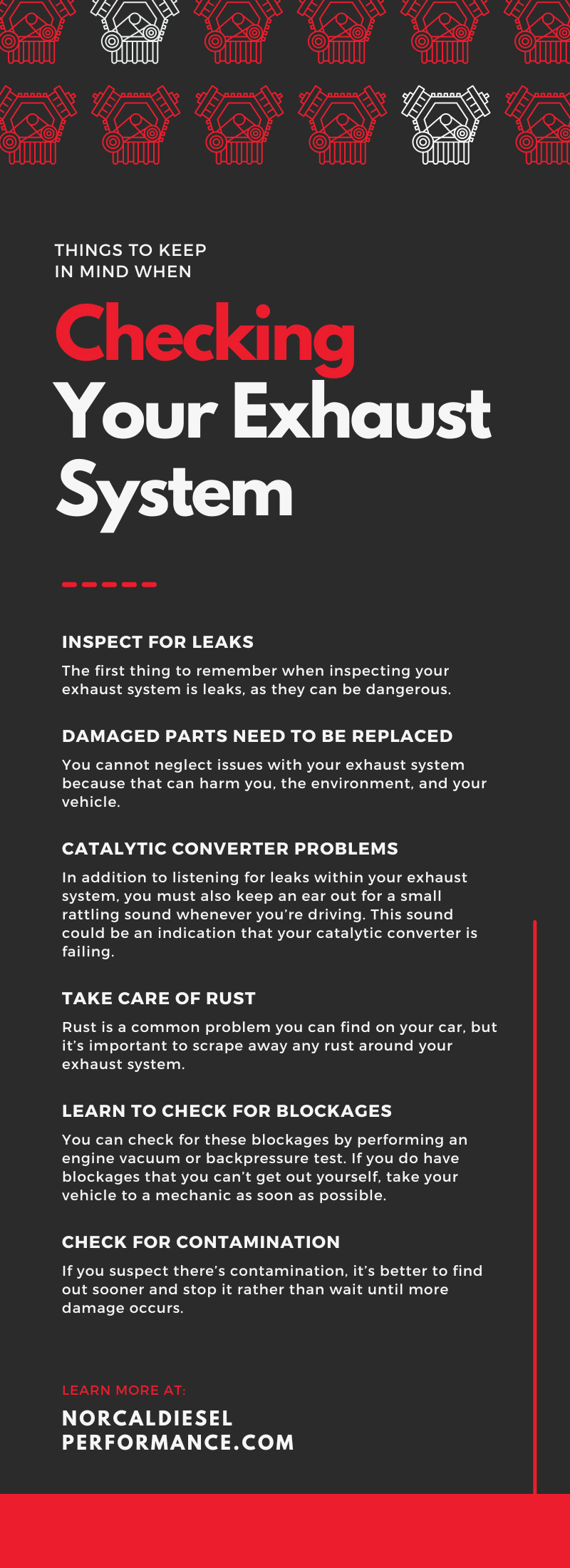


The exhaust system is one of the most important components of any vehicle, but that doesn’t mean it simply runs perfectly. Instead, it is subject to failure like every other car part, especially after years of wear and tear. Thankfully, you can work on it and replace it yourself. Keep reading to learn about the biggest things to keep in mind when checking your exhaust system to ensure you repair it correctly.
One of the first things you’ll need to keep in mind when checking up on your exhaust system is how the system actually works. Suppose you start looking at the system with only a small precursory understanding of how everything works together. In that case, you will encounter some issues and potentially mess up the entire system.
To best understand how the system works, you must understand what exhaust is. Within your truck’s engine, thousands of small explosions are happening to push the engine pistons. These explosions produce gas, and this gas needs to leave the vehicle. Car exhaust systems direct this gas away from the engine compartment, and modern systems will also reduce the number of toxic chemicals in this exhaust to contribute less to pollution. The exhaust system has numerous different parts to achieve these goals.
The main parts are the catalytic converter, oxygen sensors, particulate filters, and the exhaust pipe. Each has a unique purpose, and it’s important to understand the purpose of each part before you check your system. Every little leak or crack you find has greater implications for the overall exhaust system, and you must know how everything works together to ensure you can fix it properly.
The first thing to remember when inspecting your exhaust system is leaks, as they can be dangerous. Another important thing to note with exhaust leaks is that they can be visible or audible. These leaks are dangerous because they can potentially release dangerous gases into the atmosphere without going through the filters that eliminate the most harmful parts. Not only could those gases go into the atmosphere, but they could also vent into the car’s cabin. Furthermore, many of the gases are odorless, meaning you won’t be able to detect them immediately.
Some common places to look for leaks are:
It’s common for exhaust leaks to happen in these areas because of corrosion or improper alignments. Keep an eye and an ear out for these leaks. If your exhaust sounds unusual, you should investigate further or take your truck in to get checked out.
When inspecting your exhaust system, it’s important to remember that if something is damaged or working weirdly, you need to replace it. You cannot neglect issues with your exhaust system because that can harm you, the environment, and your vehicle. Additionally, “parts” doesn’t only mean the bigger components, but also the smaller things, like loose gaskets or screws. It’s important to check all over your exhaust system to identify these loose pieces, missing parts, or even basic wear. Components like hangers and isolators may show this wear earlier than others, so pay special attention to them.
In addition to listening for leaks within your exhaust system, you must also keep an ear out for a small rattling sound whenever you’re driving. This sound could be an indication that your catalytic converter is failing. These converters neutralize the harmful gases in these emissions, converting harmful particles into simple molecules like oxygen, water, and carbon dioxide. There are some vehicles where the catalytic converter lasts for as long as the car, but in many other vehicles, it breaks down.
Some reasons the catalytic converter can break down are debris, leaks, electrical faults, high mileage, and unburned fuel in the exhaust system. These can damage the catalytic converter, forcing you to replace it. Unfortunately, finding out that the converter is broken isn’t always the easiest, though there are signs that you can look out for. Some telltale signs include the following:
You should consider replacing the converter if you recognize any of these signs. However, before you do so, remember to repair all powertrain control module (PCM) codes. You can work on your exhaust system all you want, but unless you specifically target these PCM trouble codes, you’ll have unresolved issues potentially hurting your vehicle.
Rust is a common problem you can find on your car, but it’s important to scrape away any rust around your exhaust system. Water can collect in and around your exhaust system, and while the exhaust is hot, it won’t fully evaporate all the condensation. This water accumulation can quickly rust and start corroding your exhaust system from the inside out. Rust will also create small holes that can draw air from outside the exhaust system and lead to backfires that further damage the exhaust system and your engine.
In addition to potentially causing backfires, rust can damage heat shields and create other holes in the exhaust system that allow the exhaust gas to go into the cabin. It is critical to get this rust out of the system before it creates these problems.
With your exhaust system, you can also have different blockages that interfere with the system’s ability to expel the exhaust. There are many causes for blockages, like outside debris or buildup in the catalytic converter. Some debris and blockages will expel as the car runs, but the debris that it can’t expel will obstruct the system and continue to damage the vehicle.
You can check for these blockages by performing an engine vacuum or backpressure test. If you do have blockages that you can’t get out yourself, take your vehicle to a mechanic as soon as possible.
Another easily overlooked part of checking your exhaust system is checking for contamination. The exhaust system connects to many other car parts, like the coolant system, and it’s easy for contamination to occur and prematurely age the exhaust system. Coolant and other fluids can wear down the exhaust system and, if left alone for too long, can even lead to the entire exhaust system failure. If you suspect there’s contamination, it’s better to find out sooner and stop it rather than wait until more damage occurs.
You must keep these seven things in mind when checking your exhaust system to ensure things go smoothly. In addition to keeping these things in mind, you’ll also need the right exhaust parts, and Norcal Diesel Performance can help! We have all the different GMC exhaust parts you’ll need to drive your pickup smoothly again!

You must login to post comments.